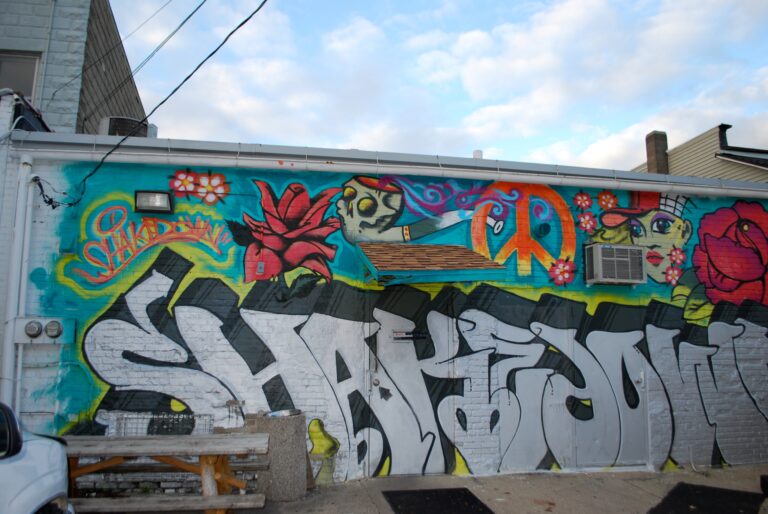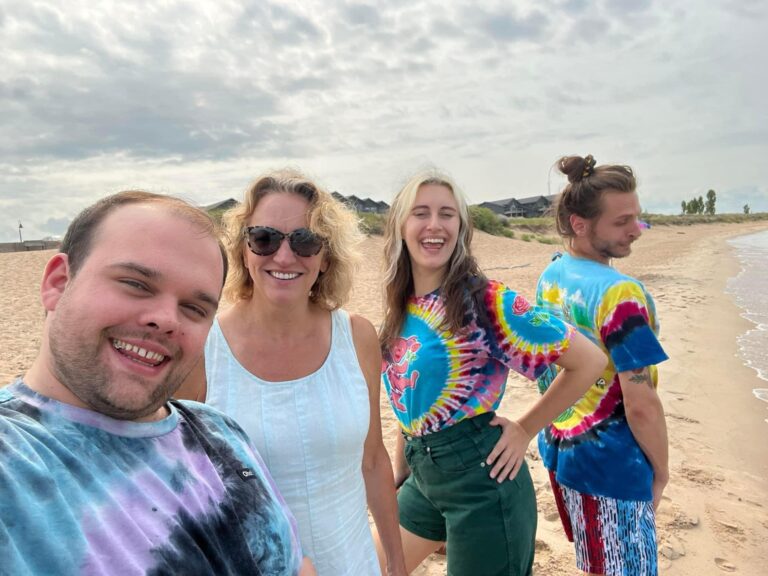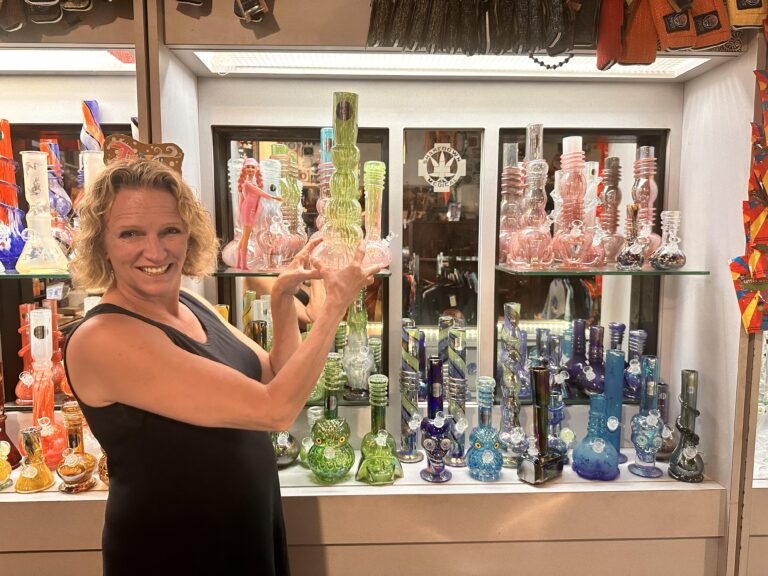Shakedown Street: The Deadhead Legacy Navigates Modern Cannabis Business Challenges
By Ryan Mills
For 32 years, Shakedown Street has flourished on the westside of Grand Rapids, Michigan. The blue and red Steal Your Face skull with a 13-point lightning bolt hangs over Leonard Street as unmistakable Grateful Dead iconography emblazoned on the Shakedown Street sign. Inside, the 2,000 sq ft space is brimming with three decades of patina—hippie boho styles drip from every corner, USA-made glass lines the walls, and one of the newest members of the Shakedown family, Mr. Casey Jones, roams the aisles, furry tail swishing. Purr.
Shakedown Street, Inc. is absolutely loaded with character. The women in charge, founder Rhonda Miller and her daughter and day-to-day manager, Joey, have created a thriving countercultural hub and a rich, parallel world grounded in Deadhead sensibilities. Having toured with the Dead for five years before opening Shakedown Street, Rhonda is a beacon of that ethos, bringing the “love and good vibes to the westside” in 1992.

Throughout the ensuing 30 plus years, she has seen more than her fair share of challenges. The store has been robbed, targeted, hassled by cops, and has survived a brick-and-mortar-killing pandemic. But the hardest thing she’s had to face? Legalization. “It’s always been a tough industry, when it was illegal it was a hard industry to be in. I’ve been arrested for six dollars’ worth of tax evasion in the store because ‘grown’ people didn’t want us there. But honestly, I would rather have the cops on my ass than this much competition . . . you can always get a good lawyer and get yourself out of it if you’re making money.”
She makes a good point. Shakedown Street at its peak pulled $1.3 million yearly, with customers coming from two to three hours
away just to visit the store. Now, in states that have legalized, it almost feels like head shops are stuck in idle, unable to move forward and struggling to compete with private equity-funded behemoths. How are we in a position where shop owners are wistfully thinking of the good ol’ days of police interference and legal fees?
Rhonda is part of a very vocal corner of the industry, sounding the alarm that legalization poses an existential threat with corporate takeovers eating up small businesses altogether. It’s not just the head shops, but the ripple effects that impact providers and distributors all down the line. “Be careful what you wish for . . . legalization is going to kill us all. I knew it was gonna happen,” she remarks pensively.

In the state of Michigan, some companies are trying to grab up control of cultivation by local growers for their own use. The Cannabis Manufacturers Association, which is a group of several large corporate cannabis companies, has been fighting with the state’s medical marijuana industry over testing protocols, as well as the cultivation of marijuana by caregivers. If they get their way, it will likely mean control of the market for a select few in order to increase their profit.
Rhonda has seen it coming. She understands all too well the many downsides with which shops like hers must now contend in a post-prohibition world. It’s a story that’s becoming all too familiar. As the industry opens up to those focused only on profits, the originals—the dedicated and the diverse—are getting squeezed by competition that’s barely competitive. In 1992, the corner gas station wasn’t competition. In 2023, the dispensary next door hurts you more than it helps you.
There might not be a happy ending. Weed is an industry about people and connections, just as much as it’s about the product. That system is now being threatened by private equity, the dysfunctionality of creating a regulatory infrastructure, and the natural evolution of head shop demographics. This is not a hustle for the faint of heart.
The store Rhonda has created is the type of place where you want to linger. A mural is being painted out back next to the 1960’s VW bus, while the monthly raffle winner is gifted a gigantic flower power-themed basket full of essential oils, hemp seed lotion, jewelry, candles, stickers, and a handcrafted pipe. Quality glass has always reigned supreme for Shakedown Street, making up about 80 percent of the store’s sales. But now the lifestyle part of it—the women’s clothing and silver jewelry, the incense, deadhead posters and stickers—those are all moving more to the center stage.

A part of this shift is due to the changing preferences of a new generation of cannabis users. With the growing popularity of alternative consumption methods such as vaping and edibles, the demand for traditional smoking accessories has declined. By catering to a broader audience interested in the culture, art and design of cannabis culture with a unique, curated experience, stores like Shakedown Street have found a niche that sets them apart from big box retailers.
The store is pivoting to enhance its online presence as well, hiring an SEO expert and a web designer. Her daughter, Joey, manages the social media channels and launches weekly new items every Friday that coincide with the store’s newsletter. Mr. Casey Jones is a frequent Instagram guest star alongside the vintage and secondhand clothing finds featuring Y2K and hippie chic styles.
“We’re in a period of growing and trying to get through it. We are staying focused on diversifying our store with inventory that isn’t just pipes. We cater to all the deadheads which really helps. I’m just going to keep going for a few more years and hope the trends that keep people away change a bit.”
In recent years, the landscape of cannabis culture has undergone a significant transformation. Head shops, those unique and specialized stores existing on the fringes of society, now have to deal with the looming big business takeover of their industry. Rhonda and Shakedown Street however, are confronting this evolving relationship between society, cannabis and the business of connecting the two, (Dead)head on.












